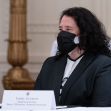On December 8, the Associated General Contractors of America filed a lawsuit against the U.S. Small Business Administration (SBA) regarding loan forgiveness for the Paycheck Protection Program loans.
According to the complaint, the SBA is making it harder for businesses to seek forgiveness for Paycheck Protection Program (PPP) loans that were handed out at the start of the COVID-19 pandemic. The lawsuit is aimed at the SBA and the Office of Management and Budget (OMB) with the intent of having these agencies revise a questionnaire that is directly related to the forgiveness of the PPP loans.
The PPP was designed to help keep small businesses afloat during the pandemic by providing loans that could be used to keep employees on the payroll. According to the lawsuit, the only requirement for loan applicants under the Coronavirus Aid, Relief, and Economic Security Act (CARES Act) was “good faith certification that the uncertainty of current economic conditions makes necessary the loan request.”
Scrutiny Aimed at SBA Questionnaire
When the PPP loans were issued, there was the possibility of loan forgiveness if the loan was used on business expenses, including rent or mortgage payments, employee benefits, debt refinancing, and utilities. However, after the loans were distributed, the SBA sent out a questionnaire to borrowers that asked for additional information, including their financial status after they were given the loan. The questionnaire also asked about financials comparing 2019 and 2020 second-quarter revenue as well as copies of bank statements.
The AGC of America also challenges the legality of how the questionnaire was created. For example, the AGC alleges that the OMB gave the authorization for the SBA to use the form in secrecy without making it available to the public for comment.
More specifically, the AGC is challenging the SBA in the way the questionnaire is worded, especially since the questionnaire seems to walk back the initial requirements for the loans. There is this sense that through the questionnaire, the SBA seems to be second-guessing whether or not those loans should have been given in the first place.
The lawsuit states, ”In short, although SBA purports (as contemplated by the CARES Act) to be interested in evaluating the borrower’s certification made back in the spring amidst great uncertainty and tumult, the questionnaire focuses exclusively on later events.”
In addition to questioning the legitimacy of the questionnaire, the AGC is asking the court to protect PPP loan borrowers from being denied loan forgiveness based on the questionnaire alone. In moving forward, the lawsuit asks for the SBA to make the questionnaire public for a 60-day period so that public comments can be collected and used for revision of the questionnaire.
The AGC’s CEO, Stephen E. Sandherr, shared in a statement released by the AGC that “The administration has every right, and obligation, to ensure businesses were eligible to apply for and receive the relief loans. But they do not have the right to use a secretly crafted form to gather unprecedented amounts of proprietary information that has little or nothing to do with the economic uncertainty that led businesses to apply for the loans in the first place.”
The AGC holds firm that the SBA's questionnaire is in violation of the Paperwork Reduction Act and the Administrative Procedures Act. By violating these acts, the SBA failed to provide basic due process.
Sandherr explains in the statement released by the AGC of America, “Resorting to a secret form that disregards congressional intent and retroactively changes the criteria for a loan is not due diligence; it is unlawful and needs to stop before employers are irrevocably harmed.”






